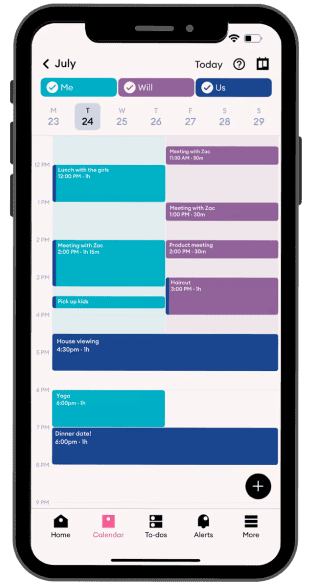After experiencing lots of sex at the beginning of the relationship, many married couples notice a downturn in the spice after a few years. Why does it happen, is it a problem, and does it have to stay that way?
Let’s have a Tough Talk about sex after marriage.
Read More: Is Scheduling Sex Unsexy? Here are three reasons you should do it.
How much sex does an average married couple have?
Let’s start with the basics: how much sex do married couples actually have on average?
A 2017 study from the Archives of Sexual Behavior reported that adults have sex 54 times in a year, on average which works out to about once a week.
The 2018 General Social Survey had similar findings. It surveyed 600 married couples about their sex lives and the most common sex frequency reported was, again, once a week.
Does that mean most married couples have sex once a week?
Surprisingly, no.
While the General Social Survey found ‘once a week’ was the most common answer, it still only represented 25% of the respondents. The remaining 75% were having sex far more or far less frequently.
For example, 5% of the respondent couples were having sex every other day, while 10% hadn’t had sex at all in the last year. There’s huge variability. So while having sex once a week is technically the average, the reality is that most married couples aren’t average.
Why does sex slow down after marriage?
Regardless of how often a couple has sex when they first get married, many notice that things cool off comparatively over time. Relationship and sex experts have a few theories about why.
“There’s a time in a relationship where you’re past the infatuation and discovery phase. You’re secure with one another and life’s stresses and obligations start to be more of a priority,” says Dr. Sanam Hafeez, a clinical psychologist.
“There are a ton of external stressors and things that may threaten being in ‘the mood’ for sex despite being in love. These can be things like work, commutes, parenting or chores.”
Dr. Brian Joy, relationship psychologist and author, agrees, emphasising that there are plenty of age-related, biological impacts too.
“Pregnancy and childbirth change sexual satisfaction and frequency dramatically, and chronic illness, weight gain and physical injury are also factors in declining sex,” he explains.
Lastly, Helen Fisher, a biological anthropologist, told Men’s Health that some of it is to do with neurology.
“That early stage of intense, romantic love drives up the dopamine system, which in turn increases testosterone and strong libido,” she explains.
“But over time, attachment becomes more and more powerful and this does not necessarily trigger the sex drive.”
Fisher is the author of Human Nature, a ground-breaking paper that explored the three major stages of mammal mating patterns: lust, attraction and attachment. These phases help to explain why there’s so much sex at the start of a relationship, but less later on, and why it’s a completely normal transition.
The lust phase floods the brain with testosterone and oxytocin, urging frequent seeking of “sexual union” with a new partner. Then you move into the attraction phase, otherwise known as romantic love, which comes up in long-term relationships. Sex is still frequent, but less urgent.
Then you come to the attachment phase, which is what long-term married couples settle into. This is when you feel compassionate love, stimulated by vasopressin and oxytocin (“cuddle hormones”), making us feel security, comfort and trust. But without the spicy chemicals of the previous phases, sex frequency drops.
In short? There are a lot of reasons why sex slows down after marriage. It’s one part psychological, one part biological, one part neurological – but 100% normal.
Is a sex slowdown after marriage a problem or a red flag?
Time to state the obvious: sex is good. But you might not know just how good.
Here are the facts:
- A good sex life has been linked with a better overall relationship.
- Sexual satisfication contributes to relationship satisfaction.
- Good sex can offset poor communication, one of the most common issues for couples.
So if a couple is having less sex than they used to, does that mean they’re not getting these benefits? Is their relationship crumbling around them? Not quite.
None of the studies above focused on sex frequency. Instead, they all focused on the quality of the participants’ sex lives – how sexually satisfied they were overall. How often you have sex can be a component of that, but it’s not the whole story.
Just look at this study from Carnegie Mellon University. Couples were split into two groups: Group A kept their sex lives the same, while Group B had twice as much sex as usual. At the end of the study, Group B said that the sex “wasn’t much fun”. They even said it started to feel like a chore!
Clearly, ‘how much’ doesn’t matter as much as people might think. Like so many things in life, good sex isn’t only about quantity – it’s about quality too.
Summary
After having lots of sex at the start of a relationship, many people find that sex slows down comparitively after marriage. It’s normal, even expected, and there are psychological, biological and neurological reasons for that drop.
Studies have shown that sex is good for your relationship, but frequency is only one component of a good sex life. In fact, focusing entirely on having sex more often instead of having better sex can take the fun out of it entirely.
All this makes one thing clear. Every couple is different, and the ‘right amount’ of sex is unique too. We can quote studies and statistics at you all day, but ultimately, sex is between you and your partner. It’s best for you to do your own research.
That begins with open, clear, honest communication about your sex life. Forget averages and percentages and talk about what you each want. Find any gaps and discuss ways to make sure both of your needs are addressed.
It can be a Tough Talk, maybe even a little embarrassing. But life’s too short for anything less than sex that’s right for both of you – in quality and in quantity.
Great sex often starts with a great date. Make a plan for more (and better) quality time together with Cupla, the shared calendar app designed exclusively for couples. Get reminders to plan regular date nights, keep on top of your relationship admin with sync’d to-do lists and integrated goals (with reminders!) – so that when you’re looking to have sex – everything is off your plate! Trial it now for free on iOS and Android.









